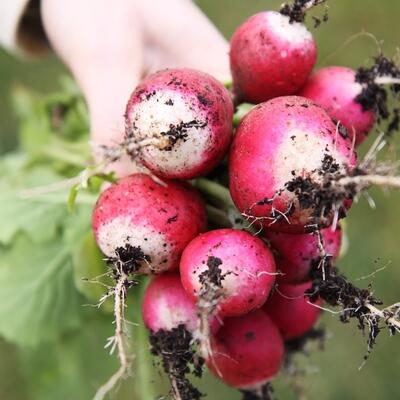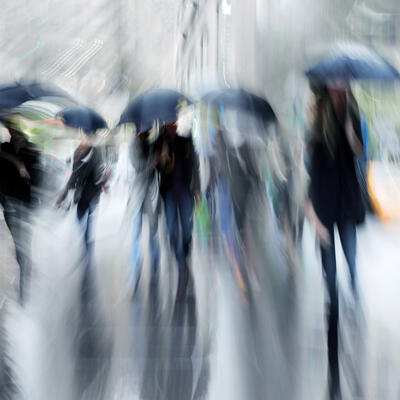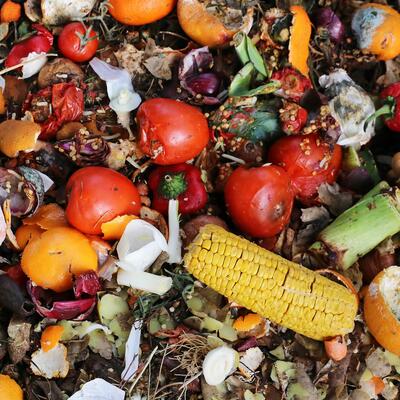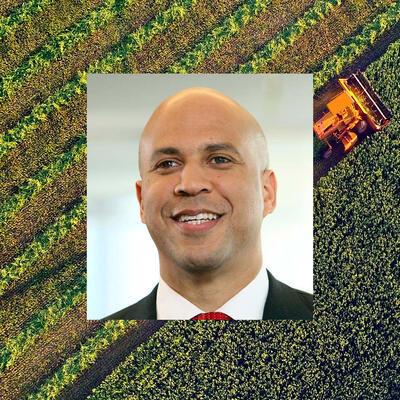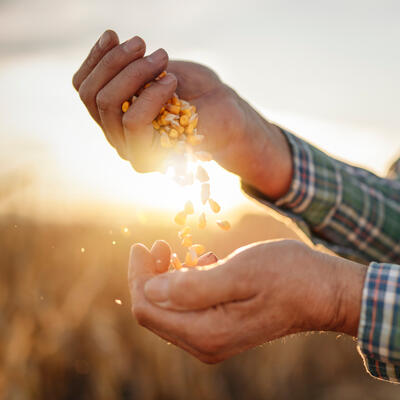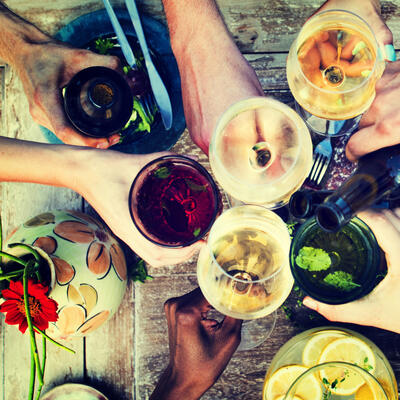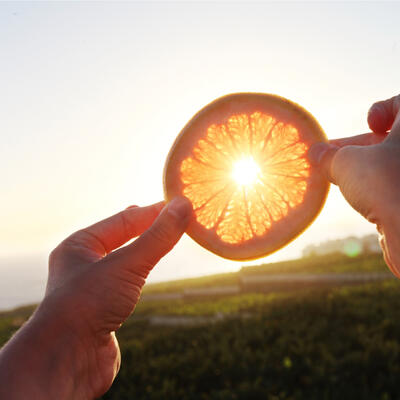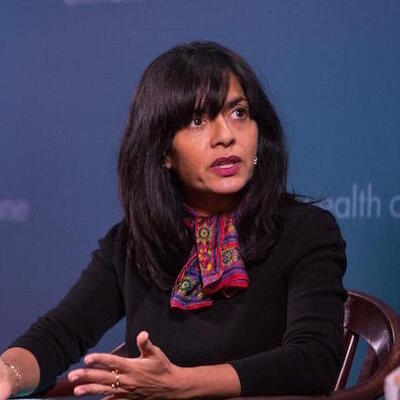
Bread, Wine and Chocolate in a Warming World
Guests
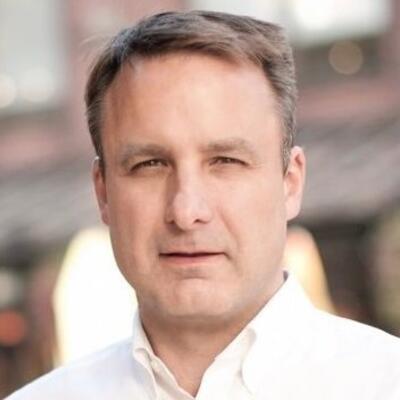
Jonathan Foley
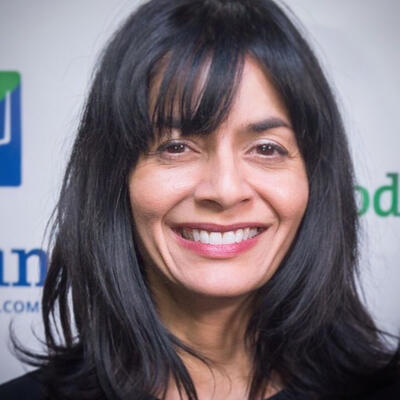
Simran Sethi
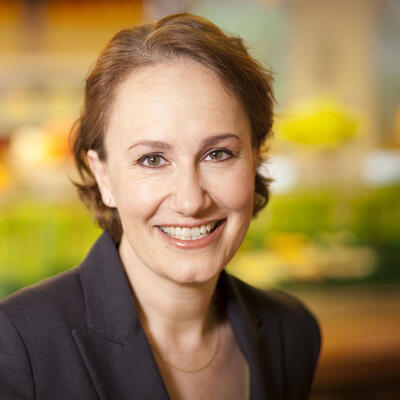
Helene York
Summary
Connecting the dots between the foods we love and our environment may be one way to engage people in the climate change fight – one cup of coffee at a time.
Jonathan Foley, Executive Director, California Academy of Sciences
Simran Sethi, Author, Bread, Wine, Chocolate: The Slow Loss of Foods We Love
Helene York, Global Director, Responsible Business, Compass Group@Google
This program was recorded in front of a live audience at the Commonwealth Club of California on October 18, 2016.
Full Transcript
Greg Dalton: From the Commonwealth Club, this is Climate One, leading the conversation about America’s energy, economy and environment. I’m Greg Dalton.
Today we’re going abroad to explore how food is changing with our industrial economy and its destabilizing pollution. We’ll explore the impacts of climate disruption on the foods we love, chocolate, wine, beer, bread and other sensual pleasures. What are farmers and food companies doing to give people more healthy and tasty choices for the food they put on their kitchen table? We also will talk about food security in the United States and elsewhere and whether GMOs can help feed a hot and crowded world of 9 billion people.
We’re pleased to be joined by three food experts. John Foley is an environmental and agricultural expert who is Executive Director of the California Academy of Sciences. He’s the author of more than 130 scientific articles. And in 2014 he authored a cover story for National Geographic on the future of food. Simran Sethi a journalist and journalism educator. She's a former environmental correspondent for NBC news and former anchor of the PBS Quest series on science and sustainability. She’s the author of the book “Bread, Wine, Chocolate: The Slow Loss of Foods We Love”; it’s now out in paperback. And Helene York is global director for responsible business at Bon Appétit Management Company which provides food to Google and other companies at 650 cafés around the country. She’s also a faculty member at The Food Business School, The Culinary Institute of America. Please welcome them to Climate One.
[Applause]
Simran Sethi, let's begin with your story. You write that you quit a job you couldn't get fired from. Sold your house, gave away your car and started a journey to learn how to save foods we love. So first of all, why did you do that and then tell us about that journey.
Simran Sethi: Why...you know, I felt like once, I was in Italy doing research for a fellowship. And I was looking at GMOs. And one had to make the case for being in Italy. So I was trying to penetrate the Vatican and really explore the moral imperatives for and against genetic engineering. And I was speaking to scientist after scientist and what they kept saying to me was, that’s something that’s a big deal in your country. But what we’re concerned about is the loss of agrobiodiversity. And I thought to myself, I had been, you know, I was a tenured associate professor, so that was a job I couldn’t get fired from. And I was teaching all my courses through the lens of food. I am someone who is quite interested in what I eat, how I eat and eating well.
And this wasn't something that was on my radar. And once I found out more about it. Once I understood that every element that makes food and agriculture possible was being compromised. The loss of agricultural biodiversity in the soil, the seed, the pollinators, plants, animal, aquatic life. I realized that this was a story I had to tell. So I left my job, I quit the job I couldn’t get fired from. And I embarked on a five-year journey across six continents to better understand the sources of our food, the centers of origin, the centers of diversity and the reason sustaining this diversity mattered.
Greg Dalton: And we’ll get into that, all the tastes and the places that you went. Helene York, tell us about your story. How you came to be a, you know, you manage food supply chains for large organizations. How did you come to that?
Helene York: I found an ad in Craigslist.
[Laughter]
Seriously, that I've always loved food. I’m from Brooklyn, New York you can tell by how I use my hands. But I have actually from a family that immigrated to the United States in the food business. And it's always been a big part of my life. Yes, it is true I found my job, my first job with Bon Appétit Management Company from Craigslist. But really what I have done my entire career has been the translator between business and environmental science between the private sector and the public sector.
And I'm really interested in the relationships and building partnerships. It seems to me there’s this extraordinary divide between urban people and rural people who actually grow our food. And this is true in many places around the world definitely here in the United States. The first job I took with Bon Appétit was actually as an educator as well, which was to teach chefs about how their choices in seafood could really enact more sustainable seafood and become part of a global movement.
And this was back in the days when the Monterey Bay Aquarium Seafood Watch Program was very young, still trying to figure out a lot of things but very much rooted in science and trying to translate that to chefs who are like my customers want tuna or salmon, salmon or tuna and really try to broaden their horizons. And it really has led me on the path to ask many, many, many questions.
I am now a supply chain manager, coaching chefs and procurement officers on six continents. So I will say this just to finish off my story. The more questions I ask, the more questions I develop. And I'm both enthralled by that, a little scared by that. But there is so much to learn and that there is so much under the surface that I think we've only begun to start thinking about it. And thank you for your contribution to it.
Greg Dalton: Jonathan Foley, you recently moved from the land of corn to the land of Chardonnay here in the Bay Area. So tell us about how your journey coming to food as a deep expertise.
Jonathan Foley: Well I’m a global environmental scientist. And I've worked on issues like climate change, on biodiversity loss, on freshwater issues. Kind of all these doom and gloom issues, right. And one thing that kept on popping up every single time was the importance of the food system as the biggest culprit in the environment. For example on water, you know, 70% of all the water in the world we use is used for one thing: irrigating crops. And then if you about land, by far the biggest clear of ecosystems the biggest consumer of forest lands of biodiversity habitat again, is agriculture and food once more.
And even on climate change, even though we tend to think of climate change as primarily an energy issue, about a quarter or so, maybe even as high as 30% somewhere around that number of all the climate change emissions we cause as a species come again from agriculture and associated land-use. That's bigger than any of the individual energy sectors. It’s bigger than all the world's electricity, all the transportation in the world all the manufacturing you name it. So no matter where you look around the planet, agriculture is kind of the biggest thing this planet has been hit by since the last Ice Age. And we don't really think about it that way. So we really do need to.
Greg Dalton: Yes, climate change is about as much what we eat, as what we drive or where we live. Simran Sethi, let's talk about taste. You convey some interesting things about taste. The importance of shape in the food that we taste and we're talking earlier about the importance of sound so let’s unpack the taste part of this, the fun part of it.
Simran Sethi: Well, I want to go back to what John said about this is sort of the underreported story when it comes to climate change. We immediately think of energy but really there’s, everything embedded in food. And I think that for me, you know, I've been working and talking about environmental issues for quite some time. And what wasn't happening was a lot of traction. And as I started to gravitate again toward what I love which is eating I’ve realized like wow, I can tell every story I want to tell about environmental issues through what I put in my mouth.
And when it comes to agricultural biodiversity, you know, what we’re talking about is conservation of diversity happens ex situ, out of place in a seed bank or other kinds of repositories where we save plant and animal material. It happens in situ in the wild so it's preserving the wild places where our crops grow and also where the wild relatives of our crops grow. And it’s saving it in situ on farm. I think the best example of this is an heirloom tomato, you know, it’s a tomato you wouldn’t find in the grocery story but it’s one that the farmer has grown.
It’s, you know, a locally cultivated variety and what was missing from that equation was the eaters. And so I feel like flavor is actually the pathway to conservation. We save foods by savoring them. We fall in love with something and we don't want to let it go. We don't want to have it disappear. And so for me trying to unpack flavor was looking at all the factors that influence what flavor becomes. A lot of us kind of think of it as taste in the mouth, you put something in your mouth that’s sweet or bitter, we’re done.
But it’s sight, it’s sound, it’s taste, it’s smell, it’s everything coming together and it's recognizing it’s about the actual flavor or something but that flavor is influenced by every single factor. The lighting, the sound in the room, the shape of the object, the wrapper that it comes in. And to me that's one of the more fascinating aspects of this because it points to the fact that there are many ways to change our behavior and to change what and how we eat. And part of it is by looking at the environment in which it exists.
Greg Dalton: Well some people buy specialty products, whether it's fancy chocolate or coffee, you know, these sort of craft breweries, those sorts of things that perhaps treat their, pay their workers more. There might be fair trade. Are those niche kind of things going to change the broader system or they just confined to that little niche and people can feel good about eating these things with organic coffee from or chocolate from whole foods but it’s definitely changing the system or is it just a niche?
Simran Sethi: I think it’s both. I feel that systemic change happens niche by niche. We do this one cup at a time, one glass at a time, one decision at a time. And, you know, often times it feels absolutely overwhelming especially for me in the work I did, increasingly the response was, write your elected official.
And particularly in this election cycle that notion to me seems, you know, sometimes like I just want to put my head under the pillow and never get up again. But, you know, maybe the solution is these quick and easy tips, right. Change your light bulb get a reusable bag, what have you. Well, you know, looking into the psychology of this, I was asking myself why haven’t recycling rates changed. Why isn’t there more engagement around climate change? We’re talking ourselves blue in the face here, what isn’t happening. Well, what isn’t happening is people aren’t connecting with this. I don’t have an emotional connection with the electrical grid. But I can tell you about the foods I ate. And that will connect me back to you.
And I believe this is the pathway to change. It feels like they should say, change the entire agricultural system. But if we start with that one morning cup of coffee and we recognize that chain. I talked about bread, wine, coffee, chocolate and beer on the book. And I say map it onto any food that you love because every food is under threat. And that was really the idea. I can’t tell you about everything that we grow and eat. But I can start with the things that are meaningful to me. And from there, you'll find your own connection and forge it and start to make meaning. You know, coffee has set the tone for every day of my adult life and it’s something --
[Laughter]
-- you know, chocolate, birthday cake, wedding cake, divorce substance.
[Laughter]
This is how it goes. This is it; this is the thread of my life. And my god, if I hear that this is under threat, maybe, I'll perk up and take notice. Maybe I'll take action. But if it’s just the generic like the entire agricultural system is, you know, threatened and its cause and effect, and this is what’s happening and this what will happen, you know, it’s a little, I think it’s a little tougher sell.
Greg Dalton: So Jonathan, tell us how is climate change threatening the things we love coffee, chocolate, beer, wine?
Jonathan Foley: Yeah, it was fascinating when you were talking about, you know, using the things we love. I mean, I’m sorry, you know, got divert a little bit but that’s something I’ve learned now I run a science museum.
And thing I’ve learned, the fascinating thing is if you want to get into somebody’s head, you have to go through their heart first. And for us who’s maybe not the objects of food but it’s like I can talk to anybody about climate change by showing them a coral reef or a rain forest. Everybody loves fish. Everybody loves parrots and stuff. And it doesn't become such an acrimonious or abstract notion, it's very tangible. Everybody is pro-beauty in awe and inspiration and that’s also in our food. So I just want to echo that boy that seems to make a lot of sense. But in that kind of global picture, yeah, climate change and more importantly things like, you know, disruption of water resources are happening irrespective of climate change and soil degradation are dramatically affecting a lot of the crops we depend on.
But also what even about is how it's not just the environment changing what's being grown and how it grows, but also what we choose to grow. We’re massively simplifying all the varieties of crops we grow so that there are fewer and fewer varieties in a changing planet. That's kind of a recipe for disaster. You know, there’s fewer and fewer varieties of tomatoes being grown. Fewer and fewer pulses, grains, you name it. And in a world where we don't know if climate extremes are going to be happening more frequently, but it's a good bet, that's not a smart strategy. So that's what we’re seeing right now. It’s a little bit of hit on yields but more importantly it’s probably less resilient food system because we’re putting more and more bets on fewer and fewer spots in the table and then the dice are getting loaded.
Greg Dalton: Helene York, your company supplies, probably fantastic foods to a lot of corporate campuses, large organizations. Are you trying to connect people, trying to reach their heart, are you trying to achieve social change when you're architecting that food?
Helene York: Two things. The first thing is we try to connect to the chefs and what they love because if they love something they can express it to their own customers. I'm not in the cafés. It's the chefs who are there.
So we see chefs as if you will, choice editors. And they can make the editorial decision of having, you know, broccoli on Monday and cauliflower on Tuesday every week. Or they can really mix it up and introduce their customers if you will, their users to different tastes. And that's what we encourage them to do. Certainly I did that first with seafood and especially the lower on the food chain delicious, healthy seafood that are much more abundant, much more sustainable from an environmental systemic point of view. But now also really every other kind of food, but especially plants, vegetables, fruits. We are very proud of the fact that we buy over 500 different varieties of vegetables and fruits a year.
And that's really we had set that as a goal, go after it, really try to use it and understand it. Don't try to narrow it down. And I think that when a chef is really excited about something and puts it out before his customers there is the opportunity for engagement. There are other activities and other folks work on that. And yes, I would say that that's important for a small subset. But what I really want to have happen is that the chefs get their eaters excited about things. They're all named and then they go to their supermarkets or their farmers markets and they asked for those products. They understand that it's a seasonal product.
Now let me just say one thing. It’s not just okay if you go to a farmers market looking for those things. That's where you, and I’m talking about systemic change, you gotta go to the supermarkets and you gotta ask for those things. And any of you who lived in the Bay Area, think about where we are now versus where we were in supermarkets 20 years ago. And that’s because of a lot of things. The whole culture has changed, but has a lot to do with eaters are demanding new things.
Greg Dalton: Helene York is with Bon Appétit Management Company. Other guests today at Climate One are Jonathan Foley, head of the California Academy of Sciences and the author and journalist Simran Sethi. I'm Greg Dalton.
I think we've got through this program so far without mentioning cheese which is a little bit surprising. But I want to talk about Russell Simmons who’s one of the world's most famous environmental activists and entertainers, wrote a book earlier this year called “The Happy Vegan” in which he says that animal products are destroying our planet. Let’s take a listen to part of an interview that Russell Simmons did with Big Boy radio back in April.
[Clip]
Russell Simmons: The cows, number one cause of global warming by far almost twice the trains, planes, the automobiles. So when you think about, you know, the animal industry and how much harm it’s causing especially the factory farming industry in America, you think you have to warn the people. FDA is not doing it; they tell you milk does a body good. Milk is a straight poison.
[End Clip]
Greg Dalton: That’s the entertainer and vegan advocate Russell Simmons. Helene York, you love cheese.
Helene York: I love cheese.
Greg Dalton: Are cows evil, are they a big part of climate problem?
Helene York: Oh, yeah tremendously. Although I have to give a lot of credit to the dairy industry in the United States is really, understands that their contribution they play and have really worked to improve efficiencies. That said, you know, cheese. It is, that’s one of those --
[Laughter]
-- you know, I have to tell you. So I had a program that I developed, it was a teaching program both for chefs and primarily for chefs called the low-carbon diet program. This was 2007, 2008. And it was really trying to get chefs to buy less beef, less cheese, waste less food all this sort of standard things. So now they’re standard, they were kind of eye-popping to chefs and heart wrenching to many of them in 2007.
But we really started talking about like, you know, cheese shouldn't just be a slice of cheddar, you know, 20 years ago it used to be a slice of American, now it's cheddar. But so what, it’s kind of the same thing really. And we really need to value it. You know, eat less, enjoy it more. I feel really quite strongly about that. And I think that’s true of meat. And I think that’s true of dairy products. We’ve radically increased the amount of cheese that we’ve eaten. Less milk, more cheese it's all kind of the same thing.
So many issues that the whole industry has changed just tremendously; in California we've lost many, many small dairy farms. It’s a complicated subject, but I guess my reaction to that quick video is that, you know, I think we need to have strong point of views, but we also need to embrace the producers and try to really make it easier for them to do the right thing in their production practices. So that they don't feel defiant or that we're against them. We don’t want to get rid of cheese but we want better cheese and we want to probably eat a little less of it, which you can do. You can mask it with some good culinary techniques.
Greg Dalton: Jonathan Foley, you came from Minnesota near the land of Cheeseheads, Wisconsin, et cetera. We know that as incomes rise around the world there’s dietary affluence and people crave that animal protein. So while we might follow Helene York's advice and eat less in the United States, globally isn't it just going to rise?
Jonathan Foley: Yeah, that’s a really important point. You hear a lot of rhetoric today, especially in the food industry circles about feeding 9 billion people. As if the 2 billion more people were really the problem. That's not the problem. The problem is the 7 billion people already here.
In fact, about 4 billion of the seven already here are getting richer fast. India, China, you know, Southeast Asia, Russia, Brazil, you know, all the intermediate developing countries who are developing a global middle class for the very first time in human history. And if they follow the same path of Western countries and as we got wealthier we ate a lot more meat, a lot more dairy and a lot more other things that probably aren’t very good for us and certainly not good for the planet. So it turns out that’s what driving most of the demand for increasing food amount in the world is not population growth. No, it's affluence.
And that's a choice and that’s really important to recognize. It's a choice. How much we, nobody's forcing the world to eat like Americans, you know, or all this extra cheese. So I'm kind of and I agree with you that, you know, we could be much more mindful of every ounce of cheese and meat we eat. It doesn’t have to be the center of the plate all the time or the main dish. It could be like what we, you know, let the garnish become the main dish and let the main dish become the garnish a little bit. That could be very sensible or look at the, I like to look at food at the ratio of good that it does for the world.
What nutritional value did it give you? What jobs did it create? What culture did it enhance, divided by the environmental and social harms that it might've caused all the way through its supply chain. And there meat and dairy products look a little tough. And we probably need to cut back on those. And not just other folks, we primarily in countries like the U.S. need to be at the start of that conversation.
Greg Dalton: John Foley is the head of the California Academy of Sciences. We’re talking about food here at Climate One. Simran Sethi, you started off talking about you are doing a deep dive on the moral implications of GMOs. Where did you come down on GMOs? Good thing, bad thing, somewhere in the middle?
Simran Sethi: Somewhere in the middle. In part because the technology has changed. We’re not looking at, you know, recombinant DNA technology or applying it in the same ways that we did before.
Much of the way that this technology has historically been used is for resistance to insecticides and herbicides and pesticides. So that's very different than targeting certain foods and trying to bio fortify them or create something that is more nutritious. And it’s interesting because even to hop back for a moment to the earlier comment from Russell Simmons. And the notion of sort of what these things are. All meat isn’t bad. Even within this, if we eat, you know, more chicken and less beef we’re already in better shape. If we look at the, you know the systems in which these the livestock is raised, it’s a different kind of equation. There is no sort of broad, full sweeping response to what agriculture is.
The refrain that this is what we need to feed the 9 billion people that will be on this planet by 2050, John has already started to unpack that and point out that it’s not population, its consumption, that’s the challenge. But, you know, what is also to be considered is that right now we create one and a half times enough calories to feed everyone on the planet. So there's a lot of systemic work to do and there's a lot to explore. When the answer becomes the only way we can feed people is to genetically engineer our food because we have to feed all these people without looking at kind of the root causes, I think that's how we get to these very absolute places.
My biggest concern is that, you know, one in eight here in the United States is hungry. We’re throwing 40% of our food away. These aren't straight lines but these are things that we need to unpack. And things that we really need to understand and try to grapple with in a way that that brings more people to the table and that starts to understand that what we have an absence of is justice and equity. It’s not that we can't feed people; it’s that people, some of the poorest people in the world ironically are smallholder farmers. We don’t have enough money to buy this food. And that’s where the problem is.
You know, we can feed ourselves in an extraordinary way without a lot of genetic engineering if we allow biodiversity to thrive. But again, we’re not doing that, we’re moving toward an industrialized system where the global standard diet is largely comprised of wheat, rice, corn, soybean and palm oil. This is a study that was done, it was headed up by gentleman named Colin Corey. 50 years they analyze 50 years of data of what 98% of the world eats. Looking at major crops and this is what we come up with, the same types in the same amounts. So now, you know, people are suffering, you know, greater amounts of obesity than being underweight. But we’re all kind of malnourished in the middle. So I think that there's a lot of places that we need to look to for solutions that don't simply point to the direction of genetic engineering.
Greg Dalton: Helene York, Simran Sethi said something quite amazing that we already produce, what 1.5 times the calories needed. So that gets to waste. Why is there so much waste and how much, what do you do with waste from the corporate campuses that Bon Appétit serves?
Helene York: Oh, that's a lot of questions. I think the most important thing is, I’ve learned something just the other day pass me by. There is a new movement called the Reducetarians. I don’t like the term.
[Laughter]
It sounds sort of weight watchers, right? But I think --
Jonathan Foley: It’s the marketing.
Helene York: -- yeah. The idea is really we need to dial back I mean everything about our culture. And I’m talking about the United States right now. I do travel to other countries and I see it in different places. And it's really, I don't mean to bash us, but I think because I think as a whole culture we move in a direction. Our refrigerators are really large, you know, our shelves our kitchens. The expectation of generosity in hospitality is that you have really large plates.
And that is not only an American phenomenon at all. I’ve had a number of South Korean colleagues and interns over the years. And they have all said to me, and many of them have worked on my love food, hate waste program. That this is really, it is considered and it goes back to your point, affluence. That you can have food to waste; that this is a mark of achievement in a culture. And so that plays out in different cultures around the world. It does to some degree in the United States. And I’ll tell you, there are a few things that we do that I think is really important. First, you start with reducing overproduction.
And you really work with chefs. I’d be happy to get into the weeds on this some other time. We don't have the time now. But when you focus on overproduction and you really reduce that down. Then you focus on, okay, how can we may have produced a little bit too much because more people, we didn't have the same number of people come, as we expected or we overestimated. Then what you do with that food, is there another food safe way of using that food that will be delicious. And once you’ve, you know, moved out those food items into the cooler to be used another way, then you say, how can I donate it? And then lastly, how do I compost it. Think about it as an inverted pyramid. The EPA, the U.S. EPA has an inverted pyramid for society doing it that way.
We've created the one that I just gave you for chefs and cooks and it's very visual. Because let's face it, most of the people in kitchens, in commercial kitchens in the United States are not reading English. And that's a challenge. And so how do you communicate with people and again, you get to them through the heart. And this is about caring for people in our community who are hungry and really, a little video, two-minute video of where we donate that food. So we have a very, very active program of donations that are picked up twice a week. They’re putting the cooler to food safe, you know, cold chain and that's very, very important. We wouldn't want to be donating food that would make anyone sick.
Greg Dalton: We’re talking about food and the future of food at Climate One. I’m Greg Dalton. We’re going to go to our lightning round with our guests, Jonathan Foley, Simran Sethi, and Helene York. Starting with Helene York. True or false, fancy buffets at Silicon Valley company campuses include fine chocolates to sooth the techies who aren't getting much sex?
[Laughter]
Helene York: I think it might be said that fine chocolate is to increase their chances.
Greg Dalton: Okay, fair enough. Jonathan Foley, you’re entertaining a chocolate exhibit at the California Academy of Sciences that will arouse your donors and open their hearts and wallets. True or false?
Jonathan Foley: False. But a great idea.
[Laughter]
Greg Dalton: Simran Sethi, Americans often complain about simple things over a cup of coffee made with beans grown by farmers who often don't have their basic needs met?
Simran Sethi: Sad, but true.
Greg Dalton: Helene York, true or false. Big ag gets a bad rap?
Helene York: Big ag gets a bad rap, true. Middle ag, gets a bad rap because people think it’s big ag. But that’s actually the responsible sector that we need to grow and support.
Greg Dalton: Middle ag.
Helene York: Middle ag.
Greg Dalton: Jonathan Foley, true or false. The mega merger between Monsanto and German chemical giant Bayer will result in even more concentration of power in fewer hands?
Jonathan Foley: Sadly, true.
Greg Dalton: Simran Sethi, true or false. Mixing two bad wines together can create something good?
Simran Sethi: Yes. And this comes from Ann Noble, the woman who created the original aroma wheel for wine is like a professor emeritus at UC Davis and she says absolutely.
Helene York: Don’t waste it.
Greg Dalton: Have you personally verified this?
Simran Sethi: I have not.
Greg Dalton: Okay. Last one for this section for Simran Sethi. Yes or no, there’s no we in chocolate?
Simran Sethi: There is only I.
[Laughter]
Greg Dalton: This is a word association part. I’ll mention a word or two words and we ask each of our guests to respond one to three words. Jonathan Foley, corn ethanol.
Jonathan Foley: Really bad idea.
Greg Dalton: Helene York, aquaculture.
Helene York: Responsible aquaculture is good.
Greg Dalton: Simran Sethi, 3 Musketeers candy bar.
Simran Sethi: Uh, not my favorite.
[Laughter]
Greg Dalton: Helene York, Chipotle.
Helene York: A spice I love.
[Laughter]
Greg Dalton: Chipotle the Mexican food company. Formerly owned by McDonalds it had some supply-chain problems.
Helene York: That’s too many words, Greg.
[Laughter]
Greg Dalton: Helene York, who works for Google food, Yahoo food.
Helene York: My colleagues do a great job.
Greg Dalton: Simran Sethi, chocolate beer.
Simran Sethi: Oxymoron.
Greg Dalton: Simran Sethi, kale.
Simran Sethi: Not my favorite.
Greg Dalton: Alright. That ends the lightning round. Let’s give them a round of applause. I think they did really well.
[Applause]
[CLIMATE ONE MINUTE]
Announcer: And now, here’s a Climate One Minute.
Most of us enjoy starting the day with a cup of delicious organic, shade-grown, fair-trade coffee. But coffee farmers the world over are facing changes in growing conditions that could jeopardize their livelihood – and the flavors we love. Paul Katzeff of Thanksgiving Coffee Company says there’s one way for coffee distributors to help weather the changes ahead.
Paul Katzeff: You’ve got to stick with your farmer. That’s really important. As they go through the struggle and transition in this time, flavors change because the soil changes and the climate changes or the weather changes if you want to put it really close to home.
So the coffee industry, people in the coffee industry, roasters have to stay with and help the farmers grow into this new time and not just say, “Well, your coffee doesn’t taste good this year, I’m not buying it.” Because if you have any caring about that farm family you have to go through that process with them. In the long run you secure your supply for the long run because you care about them.
Announcer: Paul Katzeff is co-founder and CEO of Thanksgiving Coffee Company. He spoke at Climate One in 2014. Now, back to our delicious discussion of bread, wine and chocolate, live from the Commonwealth Club.
[END CLIMATE ONE MINUTE]
Greg Dalton: I’d like to talk about your personal gardens. Jonathan Foley, you moved from Minnesota to California. What's in your home garden?
Jonathan Foley: Yeah, so I lived in like New England and Wisconsin and Minnesota, now the Bay Area. And everywhere I’ve lived I always try to grow a kind of nano garden or orchard, even though we often live in the city. So in my last house in St. Paul, Minnesota a very, very cold place. In a yard about the size of the stage, maybe a little bit bigger. We were growing about 40 different varieties of fruits that can survive Minnesota winters. But I can’t get some of them to grow here in California which is hysterical.
So now I have a deck being in San Francisco, can’t afford a yard. And so, but it’s fantastic. I can’t grow tomatoes it doesn’t get warm enough for the fog, but we can grow, you know, pineapple, guava and lemons and limes and clementines and, you know, all sorts of crazy things. So it’s just a lot of fun. I mean we’re not really feeding the world. I’m barely feeding my salad but it’s a great thing for kids to grow up at least having a bit of a glimpse of where food might come from, even if it's just a façade.
Greg Dalton: Helene York, you have a backyard garden and tend it yourself?
Helene York: I have a, I live in Inner Sunset, the fog starts at my house. And I grow every variety of weed of the non-lucrative variety.
Jonathan Foley: No you don’t.
Simran Sethi: You’re doing it wrong.
Helene York: Yes, I am clearly doing it wrong. But, you know, that the predecessors, you know, the ancient folks who lived there had grown because I can't stop them. I won't use anything artificial to stop them so I get rough calluses pulling things out.
Greg Dalton: I want to talk about food miles. Simran Sethi, are food miles overhyped? We went through this era where Michael Pollan and maybe others woke us up to food miles and all of the sudden and those grocery stores, there’s these photographs of poetry of the farmer who grew that tomato. But did it get overdone or are food miles really that important?
Simran Sethi: I think they are important. I think the number of miles is a bit arbitrary. And I would like to see a greater focus on regional production and a greater interest in, you know, Judy Wicks, she’s the cofounder of the Business Alliance for Local Living Economies and she has a café, White Dog café in Philadelphia. And she talks a lot about how we can embrace localized models even when they come from abroad. Everything doesn’t have to come within 100 mile radius let's say.
But to look at what the production look like in the place where it did come from and support those models that are in integrity with what we value. So I think it's certainly something to consider. I certainly want to keep my mile, my food, my dollars, my food dollars in my local communities. But I also think we have access to this big blue marble and I want to savor some of the tastes from those places too but do it in a way that also honors and respects the places from which they were grown.
Greg Dalton: So suppose you're at the grocery store, conventional apple from Washington organic apple from New Zealand, which one do you buy?
Simran Sethi: You know, I don’t want to give myself a pass on this but I would go to the farmers market and I would probably choose, I would choose the conventional. And I think this is the challenge. This is one of the greatest challenges that I have faced as a journalist is the danger of a single-story, the danger of one answer. Psychologically, what that does is we as humans suffer from single-action bias. So if I say organic, then it will be organic, organic, organic. Organic from China, organic from New Zealand, doesn't matter. Well, I think that really matters. I think the relationships matter. And I'm more concerned with forging those relationships to whatever extent I can.
I can’t do this with every food that, you know, that passes my lips. But what I try to do is be very strategic about it and start to understand that there are relationships that can be formed. Maybe it's not with the coffee grower but it’s with the barista who has established that relationship and visited that farm. When it comes back to the apples, I would choose a local grower and I would ask the questions of what kind of application was done on those apples. And I would likely choose that because I do care about the carbon footprint. I do care about the food miles but I also care about those relationships. And the closer I can keep them to my mouth, the better for me.
Greg Dalton: Jonathan Foley.
Jonathan Foley: Yeah, I just want to comment that food miles have nothing to do with the carbon footprint of food. That’s something people have to be mindful of. Food transport has nothing to do with emissions. In fact, the biggest emissions of people, of moving food around are us driving to the farmers market or the supermarket. Food transport is incredibly efficient it turns out it's like about one percent of global energy use. So it’s kind of a round off here. Some far more important to address food waste and meat and deforestation than it is food miles from a carbon point of view, now from a social point of view and economic point of view, absolutely local food systems matter a lot.
But there is a little misinformation about, you know, somehow the miles driven by trucks. I mean Walmart can deliver food with far less fuel than a farmers market can. Even if it's, you know, 15,000 miles away because they’re working with volume. And it turns out neither one are very large. So I think there is a little bit of misinformation about food miles from just strictly a carbon point of view. But it doesn't mean the social and economic and other issues aren’t important, although they definitely are. I love local food too but I just wanted to kind of point that out --
Simran Sethi: No, thank you. Yeah.
Simran Sethi: Would you also clarify that it’s the type of transportation?
Jonathan Foley: Yeah, like ships are extremely efficient. So the New Zealand apple would have been a lower carbon footprint than Washington apple if you’re in San Francisco easily. And the rail will be after that, large trucks after that, the worst offender is us in a car with one bag of groceries. That's the most, it’s called the last mile problem in the transportation lingo. The last mile problem is where 99% of emissions happen. And the pickup truck with a local farmer is probably more emitter than like a big corporation shipping halfway across the world but neither one are very large.
Most of the greenhouse gases coming from agriculture coming from deforestation, methane coming from cattle and rice fields and nitrous oxide coming from over using fertilizers and most of that comes and all three of those are linked mostly to meet production more than anything else. And so cutting down meat and dairy use a little bit and reducing food waste from an environmental point of view are far more important than local or not or organic or not it turns out.
Greg Dalton: Interesting. Helene York, Simran Sethi, mentioned single-action bias organic, organic, organic. When you're sourcing for your clients, how important is organic and is an organic chicken necessarily better than one that’s not organic?
Helene York: When I’m sourcing food I'm looking at a long list of factors. You know, one of the first things that matters to me is how a farmer treats the labor on his or her farm. Because just from a food safety, I mean from a really utilitarian perspective, you treat people well they are going to treat the land and the product a lot better. But it's just a moral imperative, to me that is the most important thing. I want to see that farmers rotate crops. And that if they till the soil they do it in the least intensive way. And those that are rotating crops are, don't have to till soil nearly as much as those who are mono-cropping. I want to see that farmers use water and pesticides intentionally and judiciously. And the same thing; my favorite farmer, I will tell you, I’m not going to tell you his name. But he’s in Modesto and he has 10,000 acres.
Now to a lot of people who don't know much about agriculture that sounds like big ag, right. That is middle ag, that’s even on the smaller end, its fourth-generation family farm. He has a record for the last 25 years of what he has put in every 8 foot plot on his 10,000 acres. And he's constantly rotating that and his nephew walks the fields and checks the plants and they only spray if they absolutely have to. And most of their spray is through the drip irrigation so it's not going to spread. So it's respectful to the workers, to the people around them, to the animals on the farm next to them.
And then, you know, I'm looking for farmers who grow delicious and safe food. And all of those things really matter. And so to me organic is, you know what, if a farmer that fits all of these criteria also feels very committed to organic, I will consider that farmer. But, you know, nearly all of the organics that you find in supermarkets are grown by really big producers. It's a very, only at the farmers market where you find functionally organic. People who either can't afford the certification or who are not interested in the certification, you know, I will buy from them. There happens to be a farmers market right next to my supermarket, so I trip link. But, you know, I'm much more interested in a total responsibility picture when I identify the farms that we buy from.
Greg Dalton: Helene York is with the food management company Bon Appétit Management Company. Other guests at Climate One today are Simran Sethi, author of the book “Bread, Wine and Chocolate” and Jonathan Foley, Executive Director of the California Academy of Sciences. I'm Greg Dalton.
I want to talk about soil Jonathan Foley; some of the biggest optimists that I meet in the climate world are into soil and say that the future is dirt. And if we treat our soils with respect and restore them that could solve a big part of the climate problem. Is that true, does that math work out, does that scale?
Jonathan Foley: Not quite as well as I would hope. There are a number of famous like TED Talks something like Allan Savory for example has a very famous talk about this where no global change scientist I know would firm up those numbers. I certainly wouldn't. We've removed about 150 billion tons of carbon that used to be in trees and soil and we burned it and stuck it in the atmosphere essentially. So if we put it all back that's about well, you know, 10 to 15 years of our current emissions. And we’d be giving up a lot of the world's food supply to do it. So we could do some, it's not silver bullets, but it's silver buckshot certainly. It's, you know, that plus energy efficiency plus renewables, plus cutting down current nothing reducing deforestation absolutely it’s another climate wedge.
And if you know that whole thing to solve the climate problem it’s not a silver bullet, it can't be. But here in the Bay Area like in Marin County for example, like you know, when we throw away municipal compost here in San Francisco some of that goes to farmers in Marin and it’s spread on ranches. And that seems to be boosting greatly the productivity of grasslands up by the Point Reyes and Western Marin County. And there are independent scientists like Whendee Silver at Berkeley who are measuring like actually very big carbon uptake rates.
The problem with soil is it can't take up carbon forever. It's like a bathtub. Once you fill it up you can't fill it anymore. So that's where the math gets tricky. You might be able to store a bit and we should, more soil organic matter holds more moisture; it’s better for biodiversity. It's really good and it tucks away from the climate system all positive. But those bathtubs can only fill up so much and then they run out.
Greg Dalton: We’re going to go to our audience questions and invite your participation at the microphone in the back there. So please go there now if you can, and we’ll get as many in as we can.
Simran Sethi: If I may, while we’re queuing.
Greg Dalton: Sure. Simran.
Simran Sethi: What I said about organics. I just want to echo what Helene said. To go to an absolute side of any of these things is to really not look at the entire system. Coffee leaf rust is a disease that decimates coffee plants. Guatemala and Honduras had to declare states of emergency over this. The only way to attack this fungus is with synthetic chemicals. And these farmers who, this is how they feed their children. This is how they buy medicine. This is how they take their, you know, nourish themselves and take their children to school. Had to make the decision to lose their organic certification or save their plants. And that was the moment I realized, of course I will choose organic whenever I can. But I recognize the complexity of the situation now in a way I didn’t before. And I don't want to always be in a situation where farmers are stranglehold by this one decision.
Male Participant: My question is about urgency. And I'm just curious, and for each of your opinions you speak about it’ll be great if, you know, we ate a little less meat or a little less dairy and had a little more consciousness. And I think those are all wonderful things and I applaud you saying that. But I’d love your perspectives on should we be eating like no meat or like one day a week. Like how severe and how much impact can we as individuals have and how urgent is it to be taking really strong major shifting added changes as opposed to, you know what, we’ll just eat meat one day less this week in that kind of context with your opinion.
Greg Dalton: Simran Sethi, let’s start with you. Because you started off earlier saying that, you know, one cup of coffee can start to change the world. I’ll let you respond to that first.
Simran Sethi: Gosh, you know, from a personal perspective, the sense of urgency feel so great. The amount of agricultural biodiversity that we've lost, the warming of the planet, all of these things to me feel like things I need to be acting on now. The extent to which, the question you’re asking is to what extent, how much, when, you know, the timeline. I can’t answer that for everyone. I can say for myself that this is something I feel a deep sense of alarm around.
And this is a problem that I, I’m working every day to do what I can to solve. I think you know, Jon is probably be going to be best equipped to answer the question about the amounts of food and meatless Mondays or meatless every day of the week. But from my, you know, very limited perspective, I would say that having just returned from Papua New Guinea, meeting the first climate refugees. The community of Carteret islanders who have been, you know, called some of the first climate refugees of the world. And recognizing that they have contributed collectively, the Pacific islanders is .6% of carbon emissions and they are suffering now.
They can’t feed themselves. The land has become salinated; they’re moving to higher ground. And I watched because I was with them the amount of food. And I heard them talk about how it had been so dramatically reduced over the last few years. And these islands are believed to disappear by 2025. And so for me, the greater challenge is I may not feel that sense of urgency in this moment today, but I know people who are living this urgency now. And I have a moral responsibility to change the way I eat and change the way I live so they will be able to live at all.
Greg Dalton: Jonathan Foley is individual incremental action enough?
Jonathan Foley: It’s not -- it can’t be the only solution. I mean if we -- just a handful of individuals who say they care about the environment would be maybe 3% of Americans. If we give up, you know, on the days that end in Y everything with meat and dairy in it for example it wouldn’t be enough. So if we kind of figure out a way to bring everybody on board and find the hundred percent solution because that’s where the systemic change happens. And I think that’s why not just talking about sacrifice, we’ve been talking about things people love and making people's lives better. Like reducing food waste is good for your pocketbook. It's good for, you know, the planet, it’s good for everybody. You know, there’s no downside to reducing food waste.
One little story about food waste. As I run two kitchens at the museum I work at, you know. One is for people, we have a million and a half guests a year and we don’t use Bon Appétit, sorry. But we have another company that we won’t mention, that service all these people. We run a second restaurant though for 40,000 animals that we happen to take care of. And they probably eat better than I do. And one thing that’s kind of funny is one day the biologist who prepares the food for all the fish and the penguins and all the birds and stuff. The shipment of fresh organic produce that the animals eat, they eat that too, got mixed up and it gets sent to our human café.
[Laughter]
True story, swear to God. So the biologist is running upstairs like damn it my bananas and apples and everything else got delivered to the regular café. And he gets up there and he jokes around and he say, hey wait a minute, these are the same boxes. We’re ordering from the same farmer, the same days of the week. We can at least reduce a trip or two right there. But then the biologist from the aquarium was talking to the café people and said, what do you do when a banana goes bad or an apple got a bruise on it? And they say, well, actually we can't sell that during lunch time so it goes to the compost.
They’re like, no, it doesn’t anymore it comes to us. So a lot of the food waste from the human cafeteria is now going to the fish cafeteria and the fish don't care. Who would know, it’s all good. So while, you know, the personal virtue side of like maybe 20 people in the academy will stop eating meat tomorrow if I ask them to or something. We got, you know, thousands of pounds of food waste diverted and used very efficiently.
So I mean that’s just one little story but I think we’ve got to look at these kind of personal and systemic changes at every organization, every school, every workplace, every church, every NGO wherever you work. So there’s personal action, but there’s also kind of what can you do in the places you work and you go to school and you hang out every day. And there are lots of those examples I bet you have a hundred stories like that.
Greg Dalton: They establish cultural norms. Let’s go to our next question. Welcome to Climate One.
Female Participant: Related to that last question, my question is around, you’re in some sense probably preaching to the choir, right. Most of the people in this room care about this issue enough to be here. They’re probably eating less meat on Mondays or every day and making similar sort of conscious decisions about the rest of their food. So my question is about everyone else. And how do we as individuals in this room become advocates for this issue and how, I’d actually really love your perspective Helene. How do you become an advocate in the corporate sector where things can be done at scale?
Greg Dalton: Helene York.
Helene York: I will take that. When I speak to college groups as I often do because our company serves food at a lot of colleges I always ask students if they want to be purists or if they want to be effective. And, you know, with due respect, you can work on a really small scale and feel great about that. And I don't want to discourage anyone from doing that. But if you're looking at the beginning of your career, why not work within a larger company and really try to make change from the inside. But I do want to say that even if you are a consumer, we sort of have a media now that separates good and bad evil and it was just big and little. And there are other divisions that we talk about a lot these days.
But think about it, when McDonalds changed their filet-o-fish and they announced that they were using Marine Stewardship Council certified seafood. They were absolutely maligned by the good food press. It took them 12 years to change the fisheries from which they source that fish and they improved those fisheries dramatically. And then when they finally said, hey we want to take some credit for that, they were absolutely slammed. And what I’d like to say to students, especially but I think this applies to any of us, is we need to be consumers, it’s like shareholder activism.
Instead of saying, uh, I would never eat at that company or I’d never eat this, but why not use our receipts. And send one to those companies and say, you know what, I really care that you create a great veggie burger. I really care that you minimize food waste. I really care that we stop antimicrobial resistance and that you source food from animals that are not given routine antibiotics. And I think that if we are managed to activate as consumers of those products, we have so much more power than if we sign petitions. I mean a vegan signing a petition saying, you know, be better to animals that you serve on a plate just doesn't matter. We need to engage with those big companies and embrace them just like big farmers and say it matters to us for a whole society that we improve.
Greg Dalton: Let’s go to our next question. We have six minutes. Welcome.
Female Participant: Yeah, so I’m actually going to piggyback off of that a little bit. But I'm actually taking Helene's global sustainability supply chain course. I swear she did not plant me in the audience.
Helene York: No, I didn’t.
Female Participant: But the interesting thing that she actually spoke about in the first lecture is this interconnected web that is supply chain around agriculture. So when you pull one lever you somehow manage to cause issues around other areas. And so my question is really around messaging; how do you get somebody who is not as involved in the space and I’m thinking about my friends and family who you know are off doing different things and they have different passions. But how do you get them interested and engaged in this conversation enough that they can actually start making those decisions as you guys already talked about or start voting with their wallets. How do you get them excited about this very complex web that is agriculture?
Simran Sethi: I would like to pull back for a second because agriculture is like the world, it’s so big. There’s so many, there’s social justice, there’s environmental changes, climate change. So, here’s, you know, I spent a lot of years trying to figure out why people weren’t doing it, right. Like I talked myself, you know, silly and why weren’t people getting aboard. There’s this behavioral economists at Duke University, Debra Linville and Gregory Fischer and they talk about the finite pool of worry. That there’s only so much that we can worry about at one time. And this is a psychological construct.
It's not the people don't care, it’s not the people are, you know, dumb or obtuse, but it’s that there's only so much we can hold. So how do we engage people? Well, two ways they suggest. And this to me holds true across the board and has been really helpful in my work. We work within people's existing cares, what’s already in their pool of worry or we displaced something that's in their pool of worry. So the first place that we start is by listening to what it is that people care about and moving from that place.
If I know that you’re a chef, right, I’m going to have the conversation with you like John said this earlier, he can talk about climate change to anyone, right. That you see the route to the change and you move from that place. It’s not what my agenda is, it’s what your needs are. And I think if we can shift our orientation toward the other and move from that place, we have a much greater chance of success.
Greg Dalton: We have to wrap it up there. Our thanks to Helene York with Bon Appétit Management Company, Simran Sethi, author of the book “Bread, Wine, Chocolate: The Slow Loss of Foods We Love” and Jonathan Foley, who was Executive Director of the California Academy of Sciences. I'm Greg Dalton. You can join the conversation on Twitter using our hashtag @climateone and listen to podcasts of this and other food, wine and energy programs at climateone.org. I’d like to thank our audience in the room and listening on air. Thank you all for joining us for this conversation.
[Applause]
[END]
